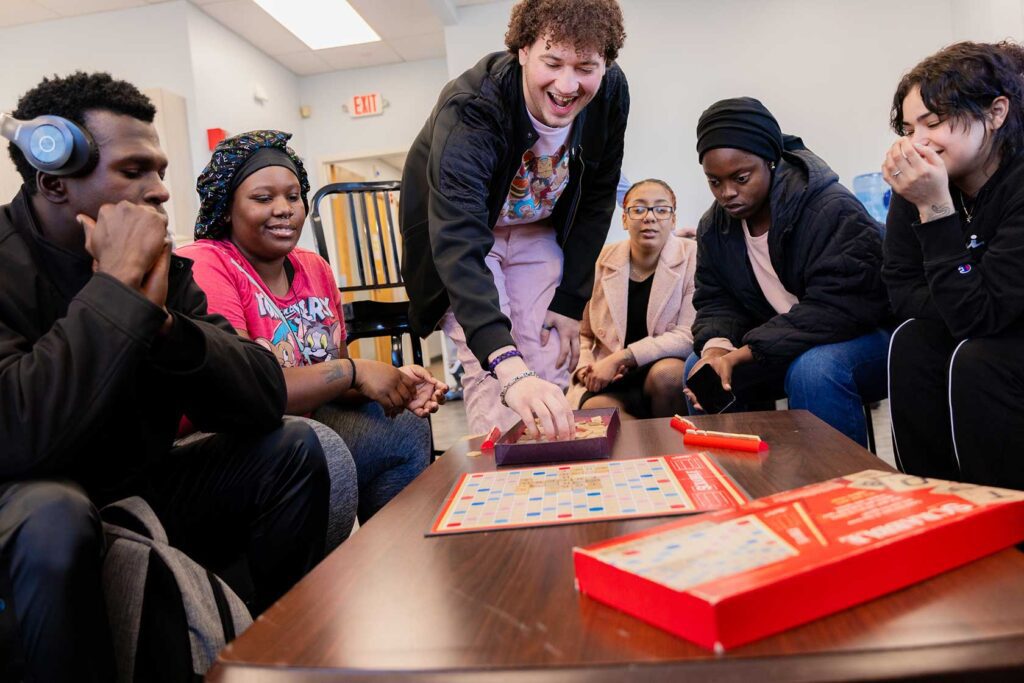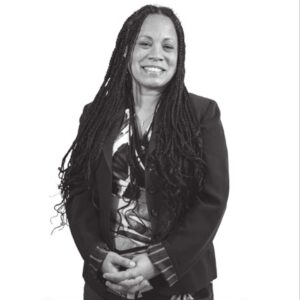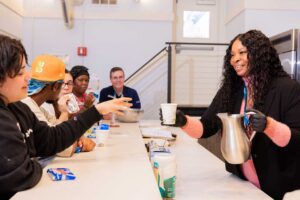
In recent years, Massachusetts youth have faced increasing levels of homelessness, and the state has struggled to keep up.
In 2022, the number of unsheltered youth in the state increased by 38% from 2019, while less than a quarter of those who sought assistance received all the help they needed, according to the Massachusetts Youth Count, a report by the state’s Commission on Unaccompanied Homeless Youth.
Bridge Over Troubled Waters is working to change that.
Founded in the 1960s by a group of women from the Sisters of St. Joseph of Boston, the Boston-based nonprofit organization serves more than 2,000 runaway, homeless and at-risk youth aged 14 to 24 by providing counseling, shelter, education, street outreach and medical services through various wraparound programs.
During the 1970s, Bridge’s mobile medical van was a constant site parked along the Boston Common, where a burgeoning population of teen runaways received services. But it was evident that more comprehensive assistance was needed to address the social and economic issues that drove youth to the streets in the first place.
In Boston alone, more than 10,000 youth between 15 to 25 years old deal with homelessness annually, according to a report from Chapin Hall at the University of Chicago. Nationwide, that number is 4.2 million. Black and brown youth are 83% more likely to become homeless, while that figure is 120% for LGBTQ+ youth, according to Bridge’s statistics.

Elisabeth Jackson, president and CEO, Bridge Over Troubled Waters. PHOTO: Ethan Byrne, Boston Polar Media
A little-known aspect of youth homelessness is that it’s “hidden in plain sight,” said Elisabeth Jackson, the organization’s president and CEO.
Homeless youth “served you coffee this morning at Dunkin’ Donuts or maybe at Starbucks … They’re probably in the same room as your child is in class,” said Jackson. She added that many people are unaware that homeless youth “are working full-time in your office or in your bank; that they are playing sports for the local high school; that they sleep in their car … that they look just like you and I.”
Jackson has helmed the organization for about a decade, and in that time, youth homelessness has become more prevalent, she said, citing the ballooning cost of living in Boston as one of the factors contributing to the increase, along with the COVID-19 pandemic.
The Massachusetts Youth Count, which surveyed over 1,000 youths and young adults under 25, identified being put on a housing or shelter waitlist, a lack of transportation, not knowing where to go, and not having enough money as some of the top reasons why the respondents wound up homeless.
Youth homelessness might conjure an image similar to those associated with adult homelessness. But youth don’t always fit that picture, Jackson said. In some cases, they even reject commonly used terms associated with homelessness, such as “shelter,” she said. As such, Bridge doesn’t call its housing services shelters. Many of the youth may not even consider themselves homeless because they crash with family members and spend nights on friends’ couches.
The difference between the young people Bridge serves and other young people, Jackson noted, is that other young people “have their families that are guiding them and supporting them, protecting them, that our young people do not have. [Our youth] have Bridge to support them and get them through those bumpy rides, but they’re not any different than the kids in college.”
Bridge puts emphasis on serving young adults, many of whom are pushed out of their family homes once they turn 18 because they are considered adults in Massachusetts. This means they are eligible for placement in shelters that serve adults. While they may be considered adults, Jackson said she believes they still require the same support they need before turning 18.
“We believe that an 18-year-old should not be in those adult shelters,” she said, adding that they shouldn’t be sleeping next to 40- or 50-year-olds and should instead be placed in housing that is “more developmentally appropriate for them.”
While the cost of providing these services has proven challenging, Bridge has had a clear impact on some of the youth who seek help at its doors.
Jackson shared an anecdote of a young man named Bruce, who joined Bridge when he was 17 due to mental health issues in his family. With the support of the Bridge program, he obtained a bachelor’s degree from Boston University and will soon graduate from Northeastern University with a master’s degree in computer science.
In another case, an unnamed young woman who had been sex-trafficked and whose family had been involved in gang activity sought refuge at Bridge, where she is safe and working on completing her schooling.
These stories also illustrate an integral part of Bridge: It’s optional. The youths are the ones coming in and asking for services, Jackson said. While Bridge runs outreach services via its Mobile Medical Van and Street Outreach programs, ultimately the decision is up to the young people whether they want to make use of the services.
Bridge’s services have evolved to meet current demands. When the organization first started its work five decades ago, its offerings included a dental clinic and day care. Those services are no longer offered because they are more readily available via other centers. Now, Bridge offers more behavioral health services, giving youth the chance to see psychiatrists and counselors if desired.
Combatting youth homelessness is crucial in preventing adult homelessness, Jackson said.
“If we want to stop the adult homelessness … we need to start when they are young. We need to provide all the services and the guidance now, because they are our future,” she said. “They are the ones that are our banker. They’re the ones giving us coffee at our favorite coffee shop. They’re the ones being our nurses. They’re the future generation that we have, and it’s very important that the future generation gets all the services they need now.”







